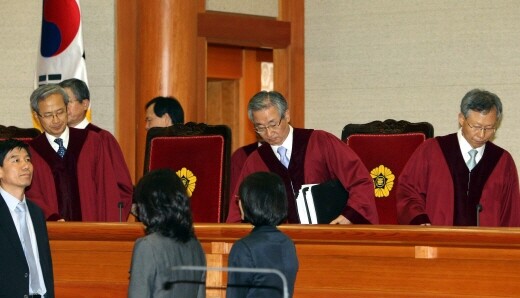hankyoreh
Links to other country sites 다른 나라 사이트 링크
Constitutional Court rules ban on nighttime outdoor assemblies unconstitutional

The Constitutional Court ruled Thursday that an article in South Korea’s protest laws banning nighttime outdoor protests that was used to shut down the candlelight vigil demonstrations against U.S. beef imports and punish participants does not accord with the Constitution. The National Assembly has until June 30 of next year to amend the law. If it fails to do so, the article loses its force. Civic groups are welcoming the decision, which virtually determines that the law in violation of the Constitution, and are calling it a decision that advances the constitutionally guaranteed freedoms of assembly and demonstration. Prosecutors plan to decide Friday what to do with the 913 individuals who participated in the candlelight vigil demonstrations and have been indicted by the application of the measure.
The Constitutional Court ruled that Article 10 of the Assembly and Demonstration Law, which bans outdoor assemblies and demonstrations prior to sunrise and after sunset, represents an excessive restriction that substantively robs people of their freedom of assembly and is in violation of the constitution. Of the nine justices, Justice Lee Kang-kook, Justice Lee Kong-hyun, Justice Cho Dae-hyen, Justice Kim Jong-dae and Justice Song Doo-hwan issued opinions stating that the article was unconstitutional. This vote fell one short of meeting the six person quorum required to rule the measure unconstitutional and strip it of its authority immediately. Justice Min Hyeong-ki and Justice Mok Young-joon stated in their opinions that the article does not accord with the constitution, were worked into the final decision. Such a decision means the article temporarily remains in place until the law can be amended to prevent a legal vacuum.
The Constitutional Court said the revival of the constitutional article that bans mandating prior approval for demonstrations in 1987 was built on the historical experience that as long as the freedom of assembly is not guaranteed, it is difficult to develop and solidify a democratic constitutional order. This must be viewed as the people’s constitutional decision to ban the suppression of the freedom of assembly, quite like the freedom of press and publishing, the court said, making clear that the freedom of assembly was a fruit of the “1987 system,” and the fruition of the democratic movement. The court explained that even in examination of similar laws in other countries, there are almost none that legally or administratively ban nighttime outdoor assemblies. Justices Kim Hee-ok and Lee Dong-heub opined that the article was constitutional, citing the specific nature of a nighttime environment and the high probability that outdoor assemblies were likely to violate public safety and order.
In October, lawyer Park Jae-yeong, who was at the time a justice with the criminal division of Seoul Central District Court, accepted an application from People’s Conference Against Mad Cow Disease organizational team director Ahn Jin-geol for a ruling on the constitutionality of the law. Ahn was indicted on charges of organizing nighttime outdoor assemblies. Park then filed for a ruling from the Constitutional Court. This led to great controversy surrounding the “Candlelight Demonstration Inference Incident,” in which Supreme Court justice Shin Young-chul, then head of the Seoul Central District Court, went to Constitutional Court Chief Justice Lee Kang-kook to ask for a prompt handling of the case and sent an email to the justice handling the criminal case asking that he proceed with the case quickly regardless of the request for a Constitutional Court ruling.
Please direct questions or comments to [englishhani@hani.co.kr]
Editorial・opinion
![[Column] Season 2 of special prosecutor probe may be coming to Korea soon [Column] Season 2 of special prosecutor probe may be coming to Korea soon](https://flexible.img.hani.co.kr/flexible/normal/500/300/imgdb/original/2024/0426/3317141030699447.jpg) [Column] Season 2 of special prosecutor probe may be coming to Korea soon
[Column] Season 2 of special prosecutor probe may be coming to Korea soon![[Column] Park Geun-hye déjà vu in Yoon Suk-yeol [Column] Park Geun-hye déjà vu in Yoon Suk-yeol](https://flexible.img.hani.co.kr/flexible/normal/500/300/imgdb/original/2024/0424/651713945113788.jpg) [Column] Park Geun-hye déjà vu in Yoon Suk-yeol
[Column] Park Geun-hye déjà vu in Yoon Suk-yeol- [Editorial] New weight of N. Korea’s nuclear threats makes dialogue all the more urgent
- [Guest essay] The real reason Korea’s new right wants to dub Rhee a founding father
- [Column] ‘Choson’: Is it time we start referring to N. Korea in its own terms?
- [Editorial] Japan’s rewriting of history with Korea has gone too far
- [Column] The president’s questionable capacity for dialogue
- [Column] Are chaebol firms just pizza pies for families to divvy up as they please?
- [Column] Has Korea, too, crossed the Rubicon on China?
- [Correspondent’s column] In Japan’s alliance with US, echoes of its past alliances with UK
Most viewed articles
- 1[Column] Season 2 of special prosecutor probe may be coming to Korea soon
- 2‘We must say no’: Seoul defense chief on Korean, USFK involvement in hypothetical Taiwan crisis
- 3No good, very bad game for Korea puts it out of Olympics for first time since 1988
- 4Division commander ordered troops to enter raging flood waters before Marine died, survivor says
- 5Is Japan about to snatch control of Line messenger from Korea’s Naver?
- 6Korea’s 1.3% growth in Q1 signals ‘textbook’ return to growth, says government
- 7Is N. Korea threatening to test nukes in response to possible new US-led sanctions body?
- 8[Editorial] Korea’s surprise Q1 growth requires objective assessment, not blind fanfare
- 9[Editorial] New weight of N. Korea’s nuclear threats makes dialogue all the more urgent
- 10‘Weddingflation’ breaks the bank for Korean couples-to-be